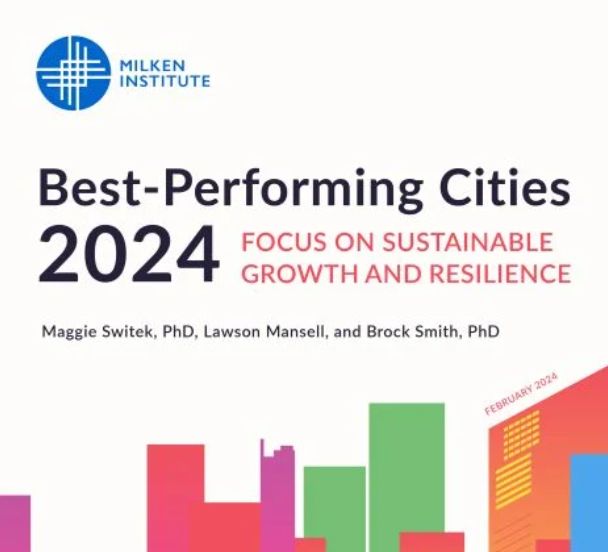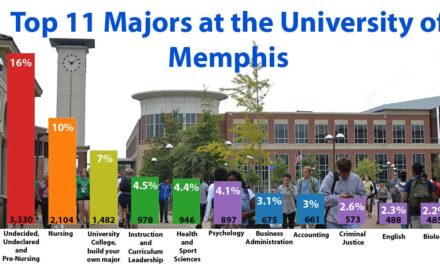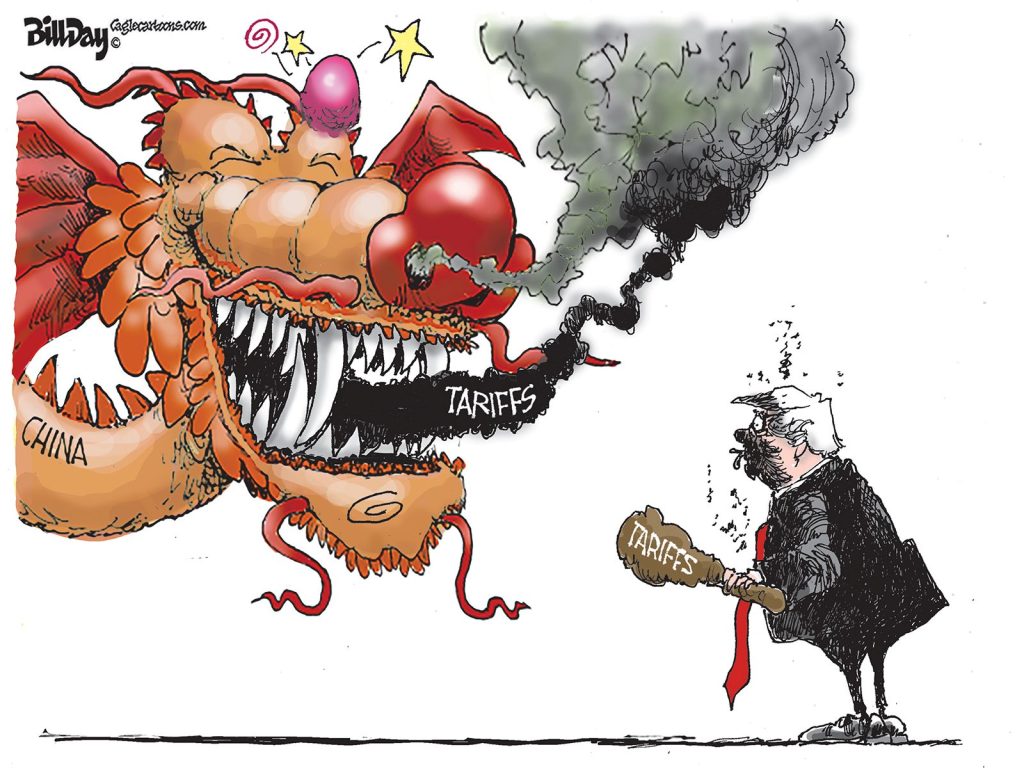The Milken Institute’s 2024 Best-Performing Large Cities report is out and the Memphis MSA is headed in the wrong direction, falling 40 spots to #175 since last year.
Although the Memphis region broke into the top 100 high-performing large cities once, it was 12 years ago when it eked in at #99. There are 200 large cities in the Best-Performing Index.
Memphis has been falling since 2022 when it was #128 and last year it dropped even more to #135 before cratering at #175 now.
It’s a disappointing trend line but the data for the report tops out at 2022 so hopefully some of the economic measurements in 2023 will boost a better report next year.
Meanwhile, Tennessee’s other metros rank significantly higher than Memphis. The Nashville metro is #6, down from #4 last year. Knoxville metro is #28, up from #32. Chattanooga metro is #46, up from #72. Clarksville metro is #95, up from 105. Kingsport/Bristol is #118, up from #161.
The Jackson metro is included in the rankings for small cities, and it crashed and burned, dropping from #47 last year to #140 this year.
Some Encouraging Signs
Despite cheerleading about the Memphis metro’s present economy, it is hard to escape the opinion that our economy is not keeping pace with the other regions in Tennessee and that the Memphis region needs a strategy that leap frogs it into the top 100 best-performing large cities. The encouraging and improving measurements for high tech suggest it is an area deserving the concentrated attention being given to it by Greater Memphis Chamber.
After all, that’s not dreaming too boldly. It would put Memphis into the middle of the rankings, not anywhere near the top.
The broad categories for the Milken Index are labor market performance, high-tech impact, and access to economic opportunities. The measurements under those three categories and determine cities’ rankings are jobs growth, wage growth, short-term job growth, high-tech GDP, high-tech concentration rank, LQ (high-tech location quotient) count rank, broadband access, housing affordability, resilient households, and Gini Index rank.
There were three categories in which the Memphis region broke into the top 100. These were especially encouraging because all of them had to do with high tech. One was high-tech GDP 2021-2022 where Memphis ranked #38, dramatically improving its #139 ranking from last year. Another measurement where it broke through the 100 top cities was #90 in LQ Count, a climb from #128 last year. The Memphis region broke into the top 100 at #96 for high-tech GDP 2017-2022, dramatically climbing from #139 last year.
Memphis Metro’s Languishing Rankings
Here is the Memphis ranking in the Best-Performing Index in the past 13 years:
#175 – 2024
#135 – 2023
#128 – 2022
#166 – 2021
#152 – 2020
#145 – 2018
#148 – 2017
#149 – 2016
#182 – 2015
#145 – 2014
#150 – 2013
#99 – 2012
#191 – 2011
The following is the ranking of regions that are often considered peer cities and whether it went up or down in the index since last year. The asterisks indicate the cities listed on the Chamber of Commerce dashboard as “Comparison Metro Areas”:
#2 – Raleigh (up one place)
#6 – Nashville* (down 2 places)
#13 – Jacksonville (up 14)
#14 – Atlanta (up 12 places)
#28 – Knoxville (up 4)
#41 – Indianapolis* (up 18)
#46 – Chattanooga (up 26)
#67 – Kansas City* (up 49)
#90 – Richmond (up 70)
#91 – Cincinnati (up 23)
#106 – St. Louis (up 34)
#113 – Little Rock (up 32)
#125 – Louisville* (down 28)
#148 – Birmingham* (down 48)
#144 – Oklahoma City* (down 19)
#154 – Detroit (up 24)
#174 – Baltimore (down 43)
#175 – MEMPHIS (down 40)
#178 – Milwaukee* (up 9)
#187 – Cleveland (down 23)
#199 – New Orleans* (down 6)
Five Principles
After only breaking the top 100 once in 12 years, it seems a good time to revisit Brookings Institution’s five principles to create a higher growth economic trajectory by getting the markets and the civics right:
Set the right goals. Set long-term goals that go beyond traditional headline economic indicators to achieve more robust measures of regional growth, productivity, and inclusions while also setting shorter-term metrics to monitor progress.
Grow from within. Leaders in new approaches to economic development focus on strengthening assets that enable their distinctive industries to flourish and grow from within, rather than rely primarily on marketing to recruit individual firms from elsewhere.
Boost trade. Contemporary economic development leaders actively support and promote expert growth and trade with other markets in the U.S. and around the world to deepen their industry clusters and bring new resources and income into the region.
Invest in people and skills. The skills of workers and level of human capital in a region are critical factors in determining the competitive position of firms and the path to growth, prosperity, and inclusion.
Connect place. The most forward-leaning leaders are harnessing regional markets and connecting local communities to them. Markets – industrial, labor, and housing – are regional but the people and assets that matter to markets are local.
Cautionary Message About Incentives
As Brookings points out, no one has cracked the code on bringing deep prosperity to cities and metro areas across the United States. It is time for Memphis to aim higher and act bigger to improve economic performance and our community’s future.
The status quo falls short, it says, when it produces siloed, short-term gains; when it targets individual firms or the wrong sectors, and when it offers incentives and subsidies that benefit the few.
In particular, Memphis should pay special attention to this cautionary message: “Firms that take an incentive are not more likely to create jobs than those that move into a state or region without one. Defraying property tax obligations through vehicles such as tax increment financing to attract a firm or commercial development removes revenue from the tax base that could have supported schools, community policing, and other public services that matter to industry and workers. In general, the attention paid to firm attraction far outweighs the small portion of jobs that result from such moves.”
***
Join us at the Smart City Memphis Facebook page and on Instagram for daily articles, reports, and commentaries that are relevant to Memphis.





